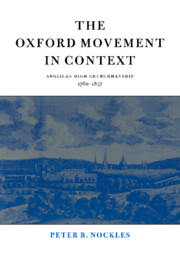Book contents
- Frontmatter
- Contents
- Preface
- List of abbreviations
- Historiographical introduction
- 1 Church and state: the politics of High Churchmanship
- 2 Antiquity and the rule of faith
- 3 Ecclesiology: the apostolic paradigm
- 4 Spirituality, liturgy and worship
- 5 The economy of salvation: sacraments and Justification
- 6 The old High Churchmen and Tractarians in historical relation
- Conclusion
- Select bibliography
- Index
1 - Church and state: the politics of High Churchmanship
Published online by Cambridge University Press: 23 September 2009
- Frontmatter
- Contents
- Preface
- List of abbreviations
- Historiographical introduction
- 1 Church and state: the politics of High Churchmanship
- 2 Antiquity and the rule of faith
- 3 Ecclesiology: the apostolic paradigm
- 4 Spirituality, liturgy and worship
- 5 The economy of salvation: sacraments and Justification
- 6 The old High Churchmen and Tractarians in historical relation
- Conclusion
- Select bibliography
- Index
Summary
ORTHODOX ‘POLITICAL THEOLOGY’, 1760–1833
One consequence of the constitutional revolution between 1828 and 1833 for the Church of England was that religion and politics could no longer be presented as but ‘two aspects of the same thing’. The gradual divorce of the two in subsequent decades made it increasingly difficult for later generations of High Churchmen to appreciate the mental framework within which the pre-Tractarian High Church operated. For the Orthodox prior to 1828, political concerns were a necessary ingredient of churchmanship and were perceived as a legitimate sphere for the application of principles which were essentially theological. In the much-altered political climate of the second half of the century when the Church of England's constitutional status had suffered erosion, the Church's theology necessarily carried less of a political load. As a result, the centrality of the political interests of pre-Tractarian High Churchmen came to appear anomalous. A later Nonconformist observer, Guinness Rogers, in contrasting High Churchmen at the beginning of the century with those in his own day, maintained, ‘the political idea which was supreme with the former is of very slight importance to the latter’. A reviewer of Churton's Memoir of Joshua Watson in the High Church Christian Remembrancer in 1861 felt called to explain away Watson's political links at the end of the preceding century with such contributors to the Anti-Jacobin Review as William Gifford, John Bowles, John Reeves, ‘and others opposed to the Home Tooke school’. The reviewer insisted that ‘these Tory interests were, however, only digressions from the main object of his life’.
- Type
- Chapter
- Information
- The Oxford Movement in ContextAnglican High Churchmanship, 1760–1857, pp. 44 - 103Publisher: Cambridge University PressPrint publication year: 1994
- 1
- Cited by



